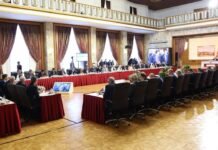Devlet Bahçeli, leader of the far-right Nationalist Movement Party (MHP) and an ally of President Recep Tayyip Erdoğan, said on Tuesday that members of a parliamentary body formed to oversee legal steps required to complement efforts for peace with the Kurdistan Workers’ Party (PKK) should travel to İmralı Island to meet with jailed PKK leader Abdullah Öcalan, Turkish Minute reported.
The PKK began an armed conflict against the Turkish state in 1984 that killed more than 40,000 people. It is listed as a terrorist organization by Turkey and its Western allies.
Öcalan, who has been serving a life sentence since 1999, called in February for the PKK to lay down arms, paving the way for a July 11 ceremony in the Kurdistan region of Iraq where fighters began destroying weapons.
Speaking at a group meeting of his MHP in the parliament on Tuesday, Bahçeli voiced support for the National Solidarity, Brotherhood and Democracy Commission, the parliamentary body overseeing the peace efforts, which has held 13 meetings and is set to convene again Friday.
“A group of deputies serving on the commission should go to İmralı to hold face-to-face talks. Messages should be received firsthand and shared with the public. I see no reason to hesitate,” he said.
His comments echoed a statement by Mehmet Uçum, chief adviser to President Recep Tayyip Erdoğan, who wrote on X that sending deputies to İmralı would not amount to negotiations between equal parties as claimed by detractors but rather a formal hearing in their capacity as lawmakers.
The pro-Kurdish Peoples’ Equality and Democracy Party (DEM Party), which represents much of Turkey’s Kurdish electorate, has long demanded that parliament hear Öcalan directly. On October 3, a DEM Party delegation including senior MPs visited İmralı and said Öcalan stressed the need to implement “legal requirements” to secure peace.
Bahçeli urges Öcalan to call on the Syrian Kurds to lay down arms
Bahçeli praised the PKK’s decision to disband and lay down its arms earlier this year but said the same steps must be taken by Kurdish forces in Syria. He called on Öcalan to issue a public appeal to the Syrian Democratic Forces (SDF) and its main Kurdish component, the People’s Protection Units (YPG), demanding that they also comply with Öcalan’s previous call to the PKK to lay down arms.
Praising the PKK leader for shouldering responsibility for peace, Bahçeli noted the group decided to lay down its arms in May and staged a symbolic weapons-burning ceremony in northern Iraq in July. “However, the SDF/YPG, which has influence in northeastern Syria, has not yet laid down its arms and has not complied with [Öcalan’s] call,” he added.
Turkey considers the SDF and YPG terrorist groups linked to the PKK, though Syrian Kurdish officials insist they are independent and not bound by Öcalan’s statements. Bahçeli urged Öcalan to make a direct appeal to the Syrian Kurdish groups to abide by the March 10 agreement signed with the Damascus government, which envisages integrating the SDF’s institutions and armed units into Syria’s central administration.
Tensions flared on Monday when clashes broke out in Aleppo between Syrian army units and SDF fighters, prompting accusations from both sides of violating the March deal’s terms.
The situation eased after Syrian Defense Minister Murhaf Abu Qasra and SDF commander Mazloum Abdi announced a ceasefire today and agreed to resume negotiations in Damascus under US sponsorship. Yet mistrust runs deep: Damascus insists on full subordination of the Kurdish force, while SDF leaders say they will not accept terms that erase Kurdish identity or local autonomy.
Bahçeli’s call for Öcalan to pressure the SDF reflects Ankara’s concern over the fate of Syrian Kurdish groups in the aftermath of the PKK’s disbanding.















